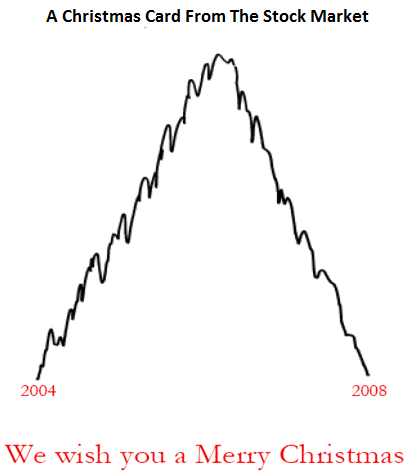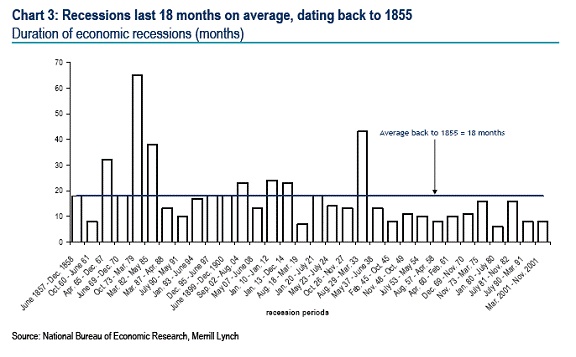| Sendedatum | 2008-12-24 13:18:08 |
|---|---|
| Ausgabe | 72 |
hier eine weitere Ausgabe des beliebten Newsletters für Masochisten und Weltuntergangssekten. Je nach Newsreader kann die Darstellung weniger als perfekt befriedigend sein, daher könnte sich ein Blick auf die Onlineversion lohnen, die außerdem verschlagwortet ist.
Inhaltsverzeichnis:
- Hotels in den USA
- Cerberus Limits Withdrawals
- Frohe Weihnachten!
- Harvard: Vielleicht doch etwas mehr als 8 Mrd verloren?
- USA: Weihnachtsgeschäft
- Statistische Rezessionslänge der USA
- Japan Should Scrap U.S. Debt; Dollar May Plummet
- US Häusermarkt
- Taiwan's Nov. Export Orders, Output Fall by Records
- Spanien rutscht in die Rezession
- Pensionsfondserfolge in Australien
- Hynix: Finanzspritze in Höhe von 595 Mio. Euro.
- ore Trying To Go Back To Jail In Tough Times
- Länderdomino Frühwarnung: Neuseeland
Inhalt:
Pricing dropped as well, leading to double-digit declines in revenue per available room, a key measure of profitability. In downtown Chicago, the decline was 20.6 percent; nationally, it was 12.9 percent.
Downtown Chicago: Hotelauslastung -13% auf 69%, Einnahmen pro Raum -20%.
Landesweit: -10.6% auf 51.9%, Einnahmen pro Raum -12.9%.
Das ist insgesamt recht eindrucksvoll.
Calculated Risk ergänzt:
Der Prozentsatz der Hotelkredite, deren Zahlungen 30+ Tage in Rückstand sind, stieg in 3 Monaten von 0.06% auf 0.55%.
Das ist immer noch wenig, aber könnte auf einen steilen Anstieg hindeuten.
Cerberus limitiert Auszahlungen auf 20% der gewünschten Summe.
Das kann man einfach nicht schöner kommentieren als Calculated Risk es getan hat:
As we all know, Cerberus is the three-headed dog who guards the gates of Hell. And at least one head is making sure investors' money doesn't escape from money hell.
Cerberus ist der dreiköpfige Hund, der das Tor zur Hölle bewacht. Und mindestens ein Kopf stellt sicher, daß das Geld der Investoren nicht aus der Hölle entkommt.

Angeblich verschickt ein Hedgefond das als Weihnachtskarte. Genial ist das ja.
Harvards Verluste liegen eher bei 18 Mrd Dollar, wenn man die illiquiden Anlagen realistisch einpreist.
[...]
The International Council of Shopping Centers and Goldman Sachs said sales in the week ended Saturday, Dec. 20, fell 0.6 percent from a year earlier. The ICSC now expects holiday sales, which include all of November and December, to fall 1.5 percent to 2 percent.
[...]
Over the past 40 years, there has not been an annual decline in holiday sales.
[...]
But this year, some shoppers decided to skip the malls and shop from home. According to comScore, last weekend's online spending of $677 million was nearly twice as high as spending during the weekend before Christmas in 2007.
Still, holiday season online shopping through Dec. 21 was down 1 percent to $24.71 billion.
Die Zahlen sind grottenschlecht.
Seit dem 2. Weltkrieg hat die durchschnittliche Rezession 10 Monate gedauert (ich vermute: in den USA). Das läßt ja hoffen, weil die jetzige Rezession dort bereits 12 Monate alt ist...
Wenn man aber den Zeitraum erweitert, auf den man schaut, zum Beispiel auf die Rezessionen seit 1855, sieht man, daß die durchschnittliche Rezession 18 Monate gedauert hat. Auch das ist ein Grund zur Hoffnung, schließlich sind die 18 Monate bereits im Juni 2009 vorbei.
Ich setze hier mal ganz bewußt den Durchschnitt mit dem Erwartungswert gleich - mir ist allerdings _sehr_ klar, daß beides wenig miteinander zu tun hat.
Nimmt man allerdings den Durchschnitt der 7 Rezessionen, die - laut Graphik - länger dauerten als der Durchschnitt, dann kommt man auf um die 35 Monate, und nimmt man den Durchschnitt der längsten 25%, kommt man auf 32 Monate.
Und dann sind wir bei November 2010 bzw. August 2010.
Diese Vorstellung macht mir zu schaffen.
The dollar may lose as much as 40 percent of its value to 50 yen or 60 yen from the current spot rate of 90.40 today in Tokyo unless Japan takes “drastic measures” to help bail out the U.S. economy, Mikuni said. Treasury yields, which are near record lows, may fall further without debt relief, making it difficult for the U.S. to borrow elsewhere, Mikuni said.
Laut dem Chef einer japanischen Ratingagentur soll Japan seine US-Staatsanleihen teilweise abschreiben, weil der Dollar 40% seines Wertes verlieren könnte wenn Japan nicht drastische Maßnahmen ergreife, um die US-Ökonomie herauszuhauen.
[...]
Combining debt waivers with infrastructure spending would be similar to the Marshall Plan that helped Europe rebuild after the destruction of World War II, Mikuni said.
Eine Kombination von Schuldenerlaß und Infrastrukturausgaben wäre ähnlich dem Marshallplann, der geholfen habe, Europa nach dem zweiten Weltkrieg wieder aufzubauen.
Bitte? Die Situation der USA heute ist mit der von Europa nach WWII zu vergleichen? _Das_ glaube ich eher weniger.
Der Vorschlag riecht nach Panik...
http://www.bloomberg.com/apps/news?pid=20601103&sid=abyzcV_k5uT4&refer=us
Purchases dropped 2.9 percent to an annual pace of 407,000, lower than forecast, according to figures from the Commerce Department today in Washington. The median sales price declined 11.5 percent from a year earlier.
[...]
The median price of a new home decreased from the same month last year to $220,400. Sales of new homes were down 35 percent from November 2007.
Verkaufszahlen Oktober08->November08: -2.9%
Verkaufszahlen November07->November08: -35%
Median-Verkaufspreis: Novem07->Novem08: -11.5%
Calculated Risk hat dazu ein paar durchaus beeindruckende Graphiken.
http://www.bloomberg.com/apps/news?pid=20601103&sid=atK2nbqp3QXk&refer=us
Purchases declined 8.6 percent to an annual rate of 4.49 million, from a 4.91 million rate in October that was less than previously estimated, the National Association of Realtors said today in Washington. The median price dropped 13.2 percent from a year earlier, the biggest decline since records started in 1968.
[...]
Sales dropped 10.6 percent compared with a year earlier.
Verkaufszahlen Oktober08->November08: -8.6%.
Verkaufszahlen November07->November08: -10.6%
Median-Verkaufspreis: Novem07->Novem08: -13.2%
Das paßt nur, wenn der freie Fall bei den Verkaufszahlen gerade eben begonnen hat - und siehe da, das hat er, nach einer Pause von einem Jahr, siehe Calculated Risk.
In beiden Fällen - neue Häuser und weiterverkaufte Häuser - reicht der Bestand auf dem Markt locker aus, um 11 Monate zu überbrücken. Tendenz der beiden zusammengerechnet: steigend (Wiederverkauf wiegt 10 mal so stark).
Auftragseingang -28.51%.
Industrieproduktion -28.35%.
Auftragseingang aus dem chinesischen Festland: -45.38%.
“There is a domino effect as demand shrinks in the U.S. and hurts China's exports and subsequently affects Taiwan,” Huang Ji- shih, the ministry's chief statistician, said in a briefing in Taipei today. Industrial production for the year will likely drop while export orders will struggle to be positive, he said.
Und nur zur Abteilung "Realitätsverleugnung":
Insgesamt unfaßbar.
Ich fasse mal zusammen, weil der Artikel kaum erträglich ist:
1. Wahrscheinlich 1.5% Schrumpfung im vierten Quartal.
2. 13.4% (von 100 oder von 55?) weniger Zimmer belegt als im letzten Jahr (2007-11 auf 2008-11).
3. Arbeitslosenquote: knapp 13%. 2009: 15%. 2010: 20%.
Spanien ist nach Jahren mit soliden Wachstumsraten nach dem Platzen einer Blase am Immobilienmarkt in die Krise gestürzt.
Eines von beiden, bitte - beides geht nicht: Entweder Blase oder solide.
Lieber Spiegel: sind die 13.4% auf 47.x% bezogen (dann wären 13.4% der Vorjahresgäste nicht gekommen und das Ergebnis nur schwach) oder auf 100 bezogen (dann wären im Vorjahr noch 55% der Zimmer belegt gewesen, und ganze Gästeheere wären zuhause geblieben)?
Wahrscheinlich Letzteres (schöne Grüße an Großbritannien).
Gruß, Uwe
Versteckt in einer Nachricht über einen Hedgefond findet sich dieses Juwel:
Australische Pensionsfonds verloren bis zum 30.9. 91 Mrd A$.
Wie ich schon gestern befürchtet habe: der Subventionswettlauf ist eröffnet.
Hynix strebe zudem für Januar eine Kapitalerhöhung über 165 Mio. Euro an, die von den Großaktionären unterstützt werde. In Folge der Ankündigung fielen Hynix-Papiere an der Börse in Südkorea um bis zu elf Prozent.
Damit ist dann auch erklärt, warum Hynix Qimonda und Infineon nicht wollte.
Ich finde es übrigens sehr unbefriedigend, daß die Welt offenbar bemüht ist, meine negativen Vorhersagen immer schneller eintreffen zu lassen...
The experts say that for some, the relative security of a warm building and three meals a day beats being homeless and hungry in the community.
Detroit: Frisch freigelassene bemühen sich, wieder ins Gefängnis zu kommen, um 3 Mahlzeiten am Tag und ein warmes Heim zu haben.
Währungsfall immiment, ob freiwillig oder nicht.
Das ist schon nicht gut, aber es kommt noch dicker:
http://www.nzherald.co.nz/business/news/article.cfm?c_id=3&objectid=10523783&ref=rss
Milch und Milchprodukte machen 27% der Exporterlöse aus. Das ist eine deutliche Abhängigkeit von einem einzelnen Industriezweig.
Der Exportanteil am BSP ist 22% (2007, Quelle: CIA World Factbook). Das heißt, Exporte von Milch und Co machen knapp 6% vom BSP aus.
http://www.nzherald.co.nz/business/news/article.cfm?c_id=3&objectid=10549474
The decline follows falls of 0.3 per cent in the March quarter and 0.2 per cent in the June quarter.
[...]
For the year to September, GDP was up 1.7 per cent.
-0.4 -0.3 -0.2 + X = +1.7: Das andere Quartal muß daher 2.6% Wachstum gebracht haben. Von 2.6% auf -0.4% ist ein beachtlicher Einbruch...
Und welcher Industriezweig nimmt besonders stark am Einbruch teil?
Sondern Landwirtschaft und Fischfang: 13% weniger Export.
Wenn man rechnet, daß der Export von Milch und Co 6% des BSP ausgemacht hat, und diese 6% um 13% gefallen sind, dann hat alleine das das BSP um 0.7% gestutzt. Mit anderen Worten: die anderen Teile der Ökonomie müssen deutlich besser gelaufen sein...
Aber weit gefehlt, sie sind es nicht:
Landwirtschaft ist insgesamt um 6% gestiegen.
Ja, wie denn das? Essen die Neuseeländer jetzt 6% mehr? Oder schummelt da jemand?
Dazu kommt dann noch der Carry Trade zwischen Japan und Neuseeland. So lange der NZ$ stabil ist, lohnt es sich für vom Nullzins bedrohte Japaner, im Hochzinsland Neuseeland anzulegen. Aber sobald der NZ$ strauchelt... wird das Geld abfließen. Und straucheln wird er. Sehr bald.
Wollen Sie den Digest abbestellen?